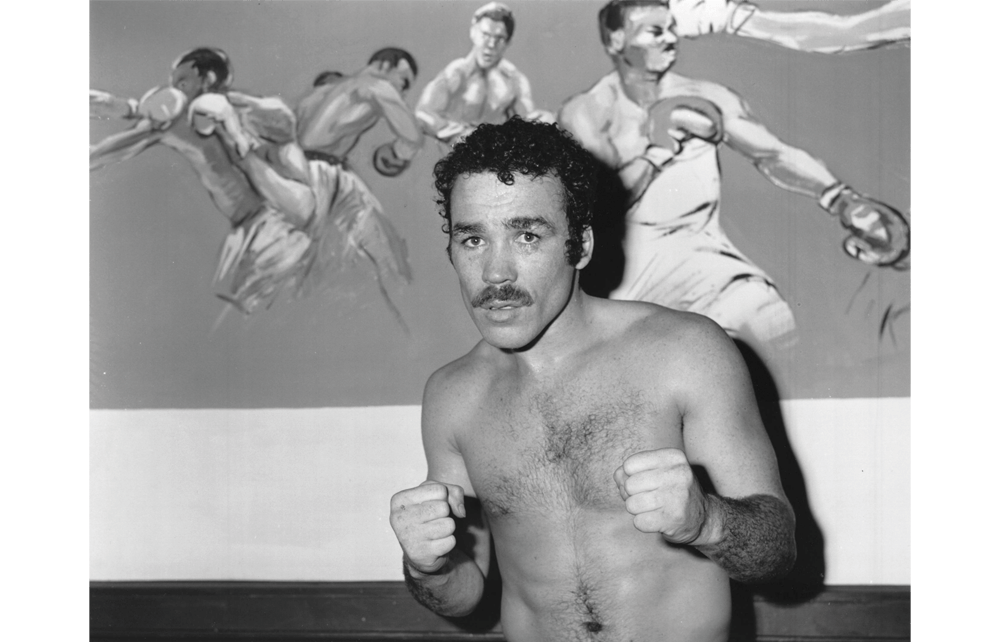Going for Gold is a biographical drama about a forgotten star of the 1970s. Frankie Lucas was a middleweight boxing champion, born on the Caribbean island of St Vincent, who won a gold medal at the Commonwealth Games in 1972. Although he lived in London he wasn’t picked for the England team and instead he wore the colours of his native land. He did them proud.
Frankie Lucas seems to have spent 42 years sitting in a council flat, smoking weed and sulking
The script, by Lisa Lintott, emphasises Lucas’s virtues and downplays his rackety personal life and his habit of smoking bales of cannabis on a regular basis. His non-stop intake of marijuana makes his sporting success all the more remarkable, but this show wants to sanitise its subject rather than presenting him as a flesh-and-blood character in a gripping drama.
The most promising incidents occur off stage. We hear that Lucas was tricked into throwing a fight against Alan Minter, the future world champion, but the facts aren’t properly developed and the details remain murky. Ditto the rumours of an unsupervised punch-up in a dressing room which ended with Lucas beating a rival boxer unconscious. What happened there? It sounds fascinating but the truth is discreetly withheld.
The low-budget production scrapes by with scout-hut decorations and charity-shop costumes. Much of the dialogue is drowned out by overloud reggae music, and the actors fail to compensate by raising their voices. Jazz Lintott plays Lucas as a surly, muttering loner which seems about right. Llewella Gideon, as his wife Gene, speaks many of her lines in a whisper so her story is hard to follow. Did she ditch him in the end? Impossible to say.
After a moderately successful career, Lucas retired in 1980 at the age of 26. He lacked the spark and the intelligence to become a promoter or even a trainer. And he wasn’t able to pursue a media career like his glamorous contemporary, John Conteh. What happened next? He seems to have spent 42 years sitting in a council flat, smoking weed and sulking.
A year before his death in 2023, he resumed contact with his estranged son and his former coach, but no details are given about the missing decades. If he had a job, he kept it a secret. The poor man seems to have spent his middle years claiming social security while getting stoned in an armchair. Another life lost to the safety net.
This warm-hearted show shouldn’t be judged by the standards of the commercial theatre because it seeks to commemorate Lucas rather than to entertain the ordinary playing-going crowd. Press night felt like a private ceremony for his extended family, and the show ended with a group hug on stage between his old pals and sparring partners. There’s a very promising business model here. At a funeral, the key events of the deceased’s life could be re-enacted by professional performers.
Queen Bette explores the character of movie star Bette Davis during her glory years. It opens with Davis shooting a film opposite Errol Flynn about Elizabeth I and the Earl of Essex. Davis wanted Laurence Olivier as her co-star so she willed herself to believe that Flynn was in fact Olivier. That sums up her character: an intransigent, combative and self-adoring diva.
But her obsessive vanity makes her a difficult person to sympathise with. Too often she’s shrill, arrogant and lacking in sensitivity. As an aspiring performer, she’s told by a drama coach that ‘to act is to dance’ and she duly demonstrates this technique by pirouetting across the stage while flinging her arms in all directions. Luckily, her movie career eliminated this bizarre practice from her repertoire.
The show is aimed at aficionados of Davis who know her story back to front. Newcomers will struggle to understand all the references. She arrived in Hollywood, aged 22, and was invited to 15 screen tests opposite actors who wanted ‘a passionate kiss’. Recalling these auditions, she seems stricken with horror but she doesn’t exactly clarify what exactly happened. Was she sexually assaulted 15 times over the course of a single morning?
Possibly. The script, devised by the performer, Jeanette Cronin, sets out to preserve Davis’s swaggering personality without showing us a chink in her armour. In 1936, she refused to take part in two films for Warner Brothers, which she felt were insufficiently complex for a woman of her exalted abilities. Jack Warner sued her and won. This disaster barely troubles her at all, and she goes sailing magnificently onward to her next professional triumph.
Her inner life remains an enigma. She barely mentions her four husbands or her three children and she’s more interested in her mother, Ruth, who seems to have been as haughty, doctrinaire and imperious as Davis herself. This is a show for hardcore Davis fans only. Neutrals may feel excluded by her wintry and impregnable façade.







Comments